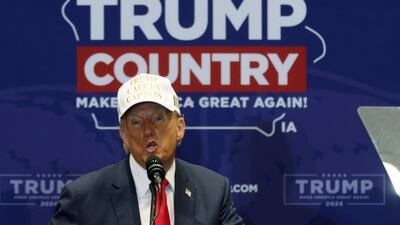The past fortnight marked the third anniversary of the January 6 insurrection, amid new signs that most Republican Party leaders are following former president Donald Trump down a dark and dangerous rabbit hole of radicalism. Key figures in the House of Representatives spent the weekend championing perpetrators of political violence and telegraphing strategies to overturn election results.
Mr Trump's worst demagoguery is thus no longer limited to a radical fringe but is rapidly becoming Republican orthodoxy.
Since Mr Trump's rise in 2016, political scientists have tracked the intensifying extremism of Republicans even compared with their European analogues. Even given overtly racist governments in Hungary and the Netherlands, and quasi-fascist parties in power in Italy and opposition in France and Germany, Trump-inflected Maga Republicans are strikingly radical.
Mr Trump has long celebrated the January 6 riot and the rioters as “heroes” and “patriots” filled with “love” and “unity”. He now calls the about 1,200 Americans convicted or facing charges over the mayhem – primarily for attacking police – “hostages”, undoubtedly inspired by widespread concern over Israelis held in Gaza.
This goes far beyond championing violent insurrectionists. It rejects the legitimacy of the US judicial and law enforcement systems, portraying courts and police as hoodlums and criminals as their victims. This is especially absurd coming from a party that indignantly portrays itself as staunchly pro-police and "law and order”.
Asked if “the people who stormed the Capitol should be held responsible to the full extent of the law”, the third-ranking House Republican, Elise Stefanik, replied: “I have concerns about the treatment of the January 6 hostages.” In the rhetoric of many Republican leaders over three years the insurrectionists have steadily morphed from “tourists” in 2021, to “political prisoners” in 2022, and now “hostages”. The hypocrisy and hostility towards the US government and constitutional order this rhetorical degradation evinces is astounding. Anyone holding hostages is, after all, clearly an evildoer.

Even at the height of liberal doubts and left-wing alienation from the American system in the 1960s and 70s, top Democratic Party leaders did not describe arrested Black Panthers or Weather Underground members as “hostages”, or suggest that the authorities were the real criminals. Even an obvious and shocking atrocity like the savage 1969 murder of Panther leader Fred Hampton in Chicago, who was drugged, shot and killed in his bed by the Illinois police, did not provoke an analogous response among top Democrats. The federal government declined to investigate itself, or the state and local police directly responsible for the assassination but was ultimately compelled to pay millions of dollars to Hampton’s family in the largest ever settlement of a civil rights violation lawsuit.
Ms Stefanik shamelessly refused to commit to accepting the election results next November, saying she would only do so if the election were “constitutional”. She claimed the 2020 election was “unconstitutional” because of how election laws in some states were changed, and cited gerrymandering in her own New York state as legitimate grounds for rejecting the results of an otherwise free and fair election. She’s brazenly and openly auditioning to be Mr Trump’s vice presidential running mate, even defending his hate speech about immigrants from Asia, Africa and Latin America “poisoning the blood” of the country.
Gerrymandering is unquestionably a severe and widespread political blight in the US. Democrats in New York, Maryland and elsewhere have abused this power, but Republicans have been, if anything, even worse in states such as North Carolina, Pennsylvania and Ohio. Either party could cite gerrymandering to overthrow virtually any election without any real constitutional or other legitimacy.
House Speaker Mike Johnson denied being an election denier while simultaneously echoing Ms Stefanik’s spurious claims that the 2020 election was “unconstitutional”. On several occasions, he has implied that he, too, is prepared to reject the November election results if he’s unhappy with the outcome.
These Republican leaders are not merely parroting Mr Trump's ”big lie” about widespread fraud in 2020, they are preparing their party and the public for another effort to overturn a free and fair election in 2024 when, as they seem to fear, he will probably again lose to President Joe Biden.
Mr Trump has threatened "bedlam" if he's disqualified from the ballot on plausible constitutional grounds and his supporters have been increasingly threatening prosecutors and his critics, including Republicans, with growing instances of “swatting” (attempting to cause a violent attack on a target by misinformed police).
The normalisation of political violence at the top ranks of the Republican Party isn't just a pressing crisis of the moment. It's a profoundly toxic historical inflection point, with the first generation of Americans since the Civil War coming-of-age politically in such a contaminated environment. Radicalism in the 1930s and 1960s became powerful fringe movements, but as Mr Trump's rhetoric and mentality becomes not merely tolerated and defended by Republican leaders but embraced and mimicked, today’s dangers have few other parallels.
Conservative evangelical columnist David French recently lamented that “in the upside-down world of Maga morality, vice is virtue and virtue is vice” as "vice signalling” is how "Trump‘s core supporters … convey their tribal allegiance”. “They’re often deliberately rude, transgressive,” he wrote, and broadly attracted to political violence.
The worst excesses once ascribed to fevered ravings by victims of “Trump derangement syndrome” have long since been fully met and far exceeded.
Eight years under Mr Trump’s leadership has eviscerated the moral core of the Republican Party and untethered it from virtually all core principles of American democracy. That won’t be easy to reverse, especially since much of the base appears convinced that key national institutions, including law enforcement and the military, are comprehensively corrupted because their leader says so.
The indispensable first step in a long and difficult road back to sanity for the American right in general, and the Republican Party in particular, will be yet another, and presumably the final, defeat for Mr Trump at the ballot box in November. All Americans desperately need that to happen, but none have more at stake than conservatives.
In the immediate aftermath of Mr Trump’s victory in 2016, in these pages I observed that “the biggest losers are ideologically traditional conservatives. They now have no party … ” With the Republican Party now unbalanced at the most senior levels, the crisis of the US right has become considerably more dire than anyone imagined eight years ago.


